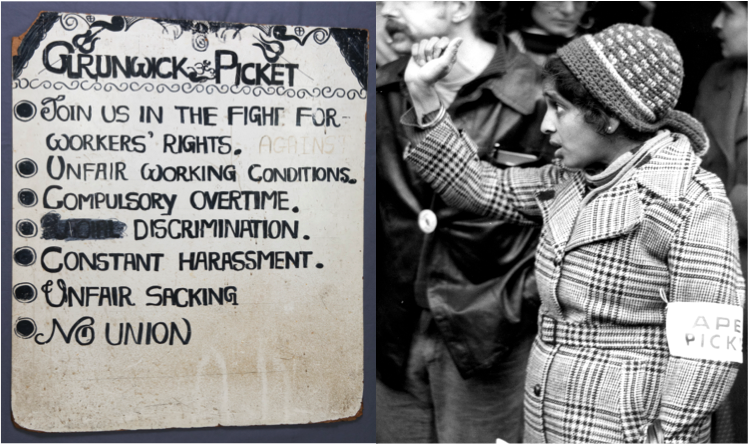Co-Chair and Trustee at People’s History Museum (PHM) Lord Steve Bassam of Brighton, a British Labour Party and Co-operative Party politician and a member of the House of Lords shares his very personal reasons for choosing to be the PHM Radical Sponsor of Jayaben Desai. We end the blog with ways you can support the museum.

Co-Chair and Trustee at People’s History Museum (PHM) Lord Steve Bassam of Brighton, a British Labour Party and Co-operative Party politician and a member of the House of Lords shares his very personal reasons for choosing to be the PHM Radical Sponsor of Jayaben Desai. We end the blog with ways you can support the museum.
‘The 1970s was a momentous decade for the Labour Party and trade union movement, starting with the miners’ strikes and ending with the defeat of a Labour government. In the middle of this was the Grunwick strike at a film processing factory in Dollis Hill, in the London suburb of Willesden.
I was a young community activist in Brighton at that point helping unemployed and homeless people and living as a squatter. I was trying to find my way in the world. Many young people of my age were horrified by the rise of the National Front, the so called National Federation for Freedom, and the emergence of rightwing ideologies determined to undermine collectivist politics and attack trade unions and work place protections.
The Grunwick dispute brought all these elements together as Britain’s rightwing press rallied behind George Ward, the owner of the Grunwick factory. The dispute was about unfair and discriminatory pay and had the backing of the moderate APEX union and its parliamentary representatives.
Many trade union and community activists sought to put the strike in a broader context of a predominantly black workforce organising and reaching out for support across the whole labour movement. It was a test too of the rule of law. George Ward should never have been allowed to flout reasonable legislation to arbitrate and find a solution to the dispute – but he did.
The strike threw up many dilemmas for trade unionists at the time. Was mass picketing the right course, should legal channels have been exhausted first, should the Labour government have been firmer in its resolve and much more? Why was more not being done to protect vulnerable non-unionised workforces, especially black workers in the work place?
In the middle of all this was this truly inspirational woman Jayaben Desai. She was genuinely remarkable. Diminutive in stature but an immensely impressive figure who was determined to stand up for the Grunwick workforce and to the bullying management, particularly George Ward the owner.
I identified with the strikers at Grunwick on both an emotional and personal level. My mother was a farm worker and for most of my childhood and teenage years had suffered from discriminatory pay rates. She earned 60% of the male farm workers’ pay rates, but worked just as hard as they did. The manifest unfairness of it made me very angry. I persuaded my mum to join the agricultural workers’ union, so at least she had some help and advice. The farm grew and packed soft fruit plants (mostly strawberries) for mail order. The owner got rich and largely at the expense of his female workforce.
The 1970 Equal Pay Act wasn’t well enforced and the farm owner used various ruses to keep pay low among his mostly female employees.
Jayaben Desai rallied her workplace to fight back, and what impressed all of us who joined the picket line was the breadth of support she built and the passion for social justice she captured. She earned the respect of all who encountered her. She was uncompromising when that was the right thing to be and made her case to often unsympathetic audiences.
Nobody could forget the sight of her walking up and down the picket line in her sari urging her colleagues to stand firm or berating very politely the police for defending the indefensible. It brought tears to the eyes of many including myself. When the dispute finally led to the defeat of those involved her dignity and determination still shone through.
Although the strike failed in its primary objective, it did represent a turning point in the development of black workforce unionisation. It made a big statement in terms of the need to develop unity across racial divides in the workplace at a time when organised labour needed to recognise that issue.
On a personal level it inspired a generation of activists like me to work in the Labour Party and broader movement for social change. It showed our strengths and weaknesses and demonstrated how big an impact an inspiring leader and organiser such as Jayaben Desai can have on people to change our world.’
Like Jayaben, there are many stories of radical women and men told throughout the museum. For the museum’s 10th birthday year, it is seeking to sign up nine more people or organisations to become Radical Sponsors as part of PHM’s broader Join the Radicals campaign. Sponsorship is £3,000 and funds raised go directly to support the museum’s collections, exhibitions and Learning Programme.
Like Steve, you can help the museum continue to celebrate and commemorate those people who campaign for ideas worth fighting for and sponsor:
Becoming a Radical Sponsor is just one of the ways people can get involved in supporting the museum. See the full list of PHM Radicals available for sponsorship and find out more about how you can Join the Radicals and support People’s History Museum.
People’s History Museum is the national museum of democracy in Manchester. Visit the museum website’s home page to find out more.